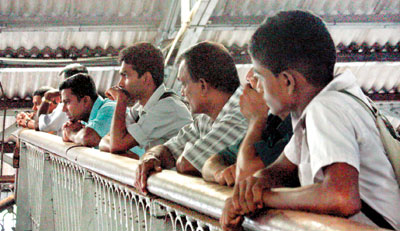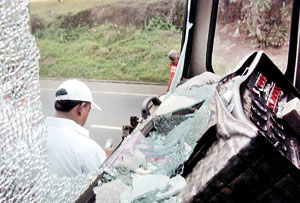News
Rail workers win rise from strike, but bus stoppage fizzles out amid threats
Hundreds of thousands of commuters faced inconvenience this week as railway employees and bus operators went on strike, demanding salary and bus fare hikes. A sudden strike action announced by the railway employees’ union from mid-night last Sunday for 48 hours was called off on Tuesday after 40 hours when Transport Minister Kumara Welgama and Ministerial Secretary Dammika Perera promised to solve their demands.

Fort Railway station: Waiting for the trains that never came. Pix by Indika Handuwala
On Thursday, Professional Trade Union Alliance Convenor Janaka Fernando said a Rs. 500 increase in the basic salary of railway workers had been finalised after agreement by both parties is awaiting approval by cabinet. Mr Fernando said his union had initially demanded a rise in basic salary from Rs.15,000 to Rs. 16,720. The Rs.500 rise granted by the government would bring the basic salary of a railway employee to Rs.15,500.
“Since we have agreed to the proposed increase in the basic salary we will not go on future strikes,” he said. When asked about government allegations that railways employees currently receive large salaries – up to Rs.150,000 – Mr Fernando denied that this was altogether true but admitted that some employees receive high salaries based on night allowances as the Railways Department had high overtime rates of Rs.180 an hour.
He emphasised that the only way to counter this problem was to fill the 40 per cent vacancy rate in the department. “There are issues in the recruitment procedures. Although people join the department they do not stay for a long period as salary increments are rarely given,” he said.
Usually, 380 trains operate each day, and 500,000 people depend on railway transport, but on Monday only about 14 trains ran, and on Tuesday only 15 trains operated, according to the railways department. The strike caused large-scale absence from work in both the public and private sectors. Hospitals reported a drop in the numbers of patients attending clinics.
P. Rajapaksa, 47, a government employee from Gampaha who has been travelling to work by train for 22 years, said that he had had to take leave on Monday due to the strike. “The train strike affected almost all sector employees who travel from out-station to Colombo,” he said.
He said it had been impossible to take leave again on Tuesday, when the strike continued, so he had travelled in by bus. Public sector workers were the most affected by strikes because they travelled further to work, Mr Rajapaksa said. Ayomi Sandruwani , 25, a private sector employee from Ambalangoda, said she usually traveled to work by train but because of the strike had had to use buses, which was time-consuming.

‘You’re with us or against us’ ![]() rivate buses in Beruwela that was among those damaged for not complying with the call to strike. Pix by S. Siriwardhena
rivate buses in Beruwela that was among those damaged for not complying with the call to strike. Pix by S. Siriwardhena
“I start at 4 a.m. every day to Colombo by train and I reach by 7 a.m. but when I go by bus I had to travel an additional two hours,” she complained. Sri Lanka Transport Board Vice Chairman L.A. Wimalaratne said that 150 extra buses had been operating due to the strike, especially in the coastal routes.
“We usually operate 500 SLTB buses a day, but additionally 150 buses were operating on Monday and Tuesday due to the train strike,” he said. He said the strike had sent up SLTB revenues by Rs. 6 million from Rs.53 million.Department of Railways Commercial Superintendent Sisira Kumara said the department had not lost money over the strike because of the quantity of fuel saved when the trains did not run
Private bus operators also went on strike this week demanding a bus fare hike but the Lanka Private Bus Owners Association (LPBOA) called off the action within three hours on Thursday saying they had faced threats. LPBOA President Gemunu Wijeratne said some of the private bus owners had been threatened and assaulted for participating in the strike and some had been arrested.
Two inter-provincial buses that defied the strike and set off for Colombo from Deiyandara and Kataragama were attacked at Beruwala.
The LPBOA is demanding a 12 per cent rise in bus fares and said it had called a strike because discussions with the government had failed. According to the national bus fare policy a bus fare rise should have been adopted by July 1, Mr Wijeratne said.
“The Minister of Private Transport, Mr C.B Rathnayake, requested us to call off the strike and promised to solve the issues in three months,” he said.
All-Ceylon Private Bus Association President Anjana Priyanjith said his organisation had not joined the bus strike because it was not the right time for industrial action and because the LPBOA had not supported an earlier strike call by the association.
Mr. Priyanjith said that his association wanted a 10 per cent fare rise, allowance for private and SLTB buses to travel to the same time-table, action to stop police from demanding bribes to ignore rule infringements and relief measures in the form of tyres and spare parts.
Follow @timesonlinelk
comments powered by Disqus

